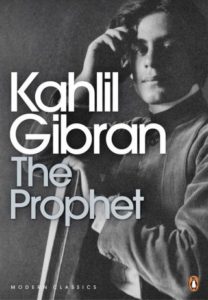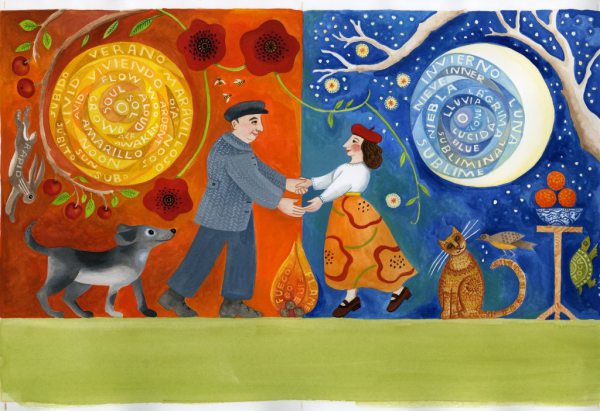The Difficult Balance of Intimacy and Independence: Beloved Philosopher and Poet Kahlil Gibran on the Secret to a Loving and Lasting Relationship
INSPIRATIONAL, 25 Mar 2019
Maria Popova | Brain Pickings – TRANSCEND Media Service
“Love one another but make not a bond of love: let it rather be a moving sea between the shores of your souls.”
 “What’s the use of falling in love if you both remain inertly as-you-were?” Mary McCarthy asked her friend Hannah Arendt in their correspondence about love. The question resonates because it speaks to a central necessity of love — at its truest and most potent, love invariably does change us, deconditioning our painful pathologies and elevating us toward our highest human potential. It allows us, as Barack Obama so eloquently wrote in his reflections on what his mother taught him about love, “to break across our solitude, and then, if we’re lucky, [be] finally transformed into something firmer.”
“What’s the use of falling in love if you both remain inertly as-you-were?” Mary McCarthy asked her friend Hannah Arendt in their correspondence about love. The question resonates because it speaks to a central necessity of love — at its truest and most potent, love invariably does change us, deconditioning our painful pathologies and elevating us toward our highest human potential. It allows us, as Barack Obama so eloquently wrote in his reflections on what his mother taught him about love, “to break across our solitude, and then, if we’re lucky, [be] finally transformed into something firmer.”
But in the romantic ideal upon which our modern mythos of love is built, the solidity of that togetherness is taken to such an extreme as to render love fragile. When lovers are expected to fuse together so closely and completely, mutuality mutates into a paralyzing codependence — a calcified and rigid firmness that becomes brittle to the possibility of growth. In the most nourishing kind of love, the communion of togetherness coexists with an integrity of individuality, the two aspects always in dynamic and fluid dialogue. The philosopher Martin Heidegger captured this beautifully in his love letters to Hannah Arendt: “Why is love rich beyond all other possible human experiences and a sweet burden to those seized in its grasp? Because we become what we love and yet remain ourselves.”
This difficult balance of intimacy and independence is what the great Lebanese-American artist, poet, and philosopher Kahlil Gibran (January 6, 1883–April 10, 1931) explores with uncommon insight and poetic precision in a passage from his 1923 masterwork The Prophet (public library).
By way of advice on the secret to a loving and lasting marriage, Gibran offers:
Let there be spaces in your togetherness,
And let the winds of the heavens dance between you.Love one another but make not a bond of love:
Let it rather be a moving sea between the shores of your souls.
Fill each other’s cup but drink not from one cup.
Give one another of your bread but eat not from the same loaf.
Sing and dance together and be joyous, but let each one of you be alone,
Even as the strings of a lute are alone though they quiver with the same music.Give your hearts, but not into each other’s keeping.
For only the hand of Life can contain your hearts.
And stand together, yet not too near together:
For the pillars of the temple stand apart,
And the oak tree and the cypress grow not in each other’s shadow.
Complement this particular portion of the wholly enchanting The Prophet with Virginia Woolf on what makes love last, philosopher Alain Badiou on how we fall and stay in love, Anna Dostoyevsky on the secret to a happy marriage, Mary Oliver on how differences bring couples closer together, and Joseph Campbell on the single most important factor in sustaining romantic relationships, then revisit Gibran on the seeming self vs. the authentic self and the absurdity of our self-righteousness.
_______________________________________
 Brain Pickings is the brain child of Maria Popova, an interestingness hunter-gatherer and curious mind at large obsessed with combinatorial creativity who also writes for Wired UK and The Atlantic, among others, and is an MIT Futures of Entertainment Fellow. She has gotten occasional help from a handful of guest contributors. Email: brainpicker@brainpickings.org
Brain Pickings is the brain child of Maria Popova, an interestingness hunter-gatherer and curious mind at large obsessed with combinatorial creativity who also writes for Wired UK and The Atlantic, among others, and is an MIT Futures of Entertainment Fellow. She has gotten occasional help from a handful of guest contributors. Email: brainpicker@brainpickings.org
Go to Original – brainpickings.org
DISCLAIMER: The statements, views and opinions expressed in pieces republished here are solely those of the authors and do not necessarily represent those of TMS. In accordance with title 17 U.S.C. section 107, this material is distributed without profit to those who have expressed a prior interest in receiving the included information for research and educational purposes. TMS has no affiliation whatsoever with the originator of this article nor is TMS endorsed or sponsored by the originator. “GO TO ORIGINAL” links are provided as a convenience to our readers and allow for verification of authenticity. However, as originating pages are often updated by their originating host sites, the versions posted may not match the versions our readers view when clicking the “GO TO ORIGINAL” links. This site contains copyrighted material the use of which has not always been specifically authorized by the copyright owner. We are making such material available in our efforts to advance understanding of environmental, political, human rights, economic, democracy, scientific, and social justice issues, etc. We believe this constitutes a ‘fair use’ of any such copyrighted material as provided for in section 107 of the US Copyright Law. In accordance with Title 17 U.S.C. Section 107, the material on this site is distributed without profit to those who have expressed a prior interest in receiving the included information for research and educational purposes. For more information go to: http://www.law.cornell.edu/uscode/17/107.shtml. If you wish to use copyrighted material from this site for purposes of your own that go beyond ‘fair use’, you must obtain permission from the copyright owner.
